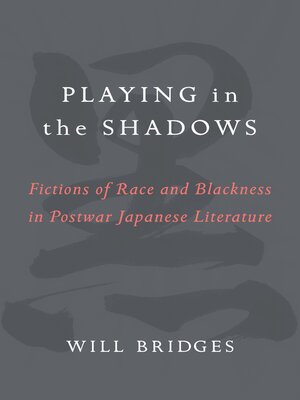Playing in the Shadows
ebook ∣ Fictions of Race and Blackness in Postwar Japanese Literature · Michigan Monograph Series in Japanese Studies
By William H. Bridges

Sign up to save your library
With an OverDrive account, you can save your favorite libraries for at-a-glance information about availability. Find out more about OverDrive accounts.
Find this title in Libby, the library reading app by OverDrive.



Search for a digital library with this title
Title found at these libraries:
| Library Name | Distance |
|---|---|
| Loading... |
Playing in the Shadows considers the literature engendered by postwar Japanese authors' robust cultural exchanges with African Americans and African American literature. The Allied Occupation brought an influx of African American soldiers and culture to Japan, which catalyzed the writing of black characters into postwar Japanese literature. This same influx fostered the creation of organizations such as the Kokujin kenkyū no kai (The Japanese Association for Negro Studies) and literary endeavors such as the Kokujin bungaku zenshū (The Complete Anthology of Black Literature). This rich milieu sparked Japanese authors'—Nakagami Kenji and Ōe Kenzaburō are two notable examples—interest in reading, interpreting, critiquing, and, ultimately, incorporating the tropes and techniques of African American literature and jazz performance into their own literary works. Such incorporation leads to literary works that are "black" not by virtue of their representations of black characters, but due to their investment in the possibility of technically and intertextually black Japanese literature. Will Bridges argues that these "fictions of race" provide visions of the way that postwar Japanese authors reimagine the ascription of race to bodies—be they bodies of literature, the body politic, or the human body itself.







